Volver
WHAT THE CRITICS ARE SAYING



 Review by Paul Byrnes, 16 December 2006, SMH
Review by Paul Byrnes, 16 December 2006, SMH
Pedro Almodovar's mournful comedy pays tribute to his mother and birthplace.
Volver, in Spanish, is the verb "to come back", but the title has several meanings. This is a Pedro Almodovar film, after all. It's partly about the district in La Mancha in central Spain where he was born and spent the first eight years of his life. He pays tribute to the women of the region, who spend their lives drying out in the howling east winds that make people there crazy.
Indeed, a narration at the start says a village in this area of Spain has the highest levels of insanity in the country, which is probably not true, but sets you wondering how they would measure it.
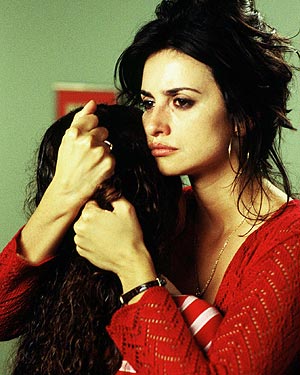 The opening shot has the wind blowing dust across a small cemetery, where Penelope Cruz, in head scarf, tends her parents' marble grave. She's Raimunda, a dark-eyed beauty with big hoops, hips and breasts, a much more luscious Cruz than we've been used to seeing since she went to Hollywood. Raimunda is with her sister Soledad (Lola Duenas) and Raimunda's 12-year-old daughter, Paula (Yohana Cobo). They have come to La Mancha to visit an old aunt (Chus Lampreave) who is dying.
The opening shot has the wind blowing dust across a small cemetery, where Penelope Cruz, in head scarf, tends her parents' marble grave. She's Raimunda, a dark-eyed beauty with big hoops, hips and breasts, a much more luscious Cruz than we've been used to seeing since she went to Hollywood. Raimunda is with her sister Soledad (Lola Duenas) and Raimunda's 12-year-old daughter, Paula (Yohana Cobo). They have come to La Mancha to visit an old aunt (Chus Lampreave) who is dying.
The cemetery is full of women tending graves, many of which are empty. The tradition, says the narration, is that people buy their graves early and look after them for years, until they move in. It's a small city of the dead but the living play an active part. The film is about the way the opposite is also true. The dead may come back and play an equally active part, even if you don't want them to.
These are strange beginnings for Almodovar. He is not usually given to sentimental praise of Spain's native culture. Quite the opposite, in fact. He based his career on the rejection of Franco, fascism and conservative family values. Now he's returning to the backward Spain he hated in order to sing its praises? Well, not exactly.
There are enough shots of dark gatherings of men to suggest his ambivalence continues but any great artist eventually confronts death and for Almodovar that means the death of his mother. And his memories of her are bound up with this place and these hardy, practical, immensely resourceful women. That's probably the main thing on his mind this time round.
In Volver, Raimunda's mother comes back, and she's played by Carmen Maura, the star of many of his early films. Almodovar and Maura had a very public bust-up after their greatest triumph together ( Women on the Verge of a Nervous Breakdown, from 1988). Her return to his fold 18 years later is like a symbolic return from the dead - but first, there is a murder.
 Peter Bradshaw, August 25, 2006 The Guardian
Peter Bradshaw, August 25, 2006 The Guardian
With its overwhelming richness, its colour and warmth, Pedro Almodo'var's new movie is set to capture your heart. Volver seemed guilelessly wonderful when I first saw it earlier this year in Cannes. Now it looks even better. The picture's ingenuities and contrivances just seem to float out of the screen, like psychedelic moodshapes. I found myself floating right along with them.
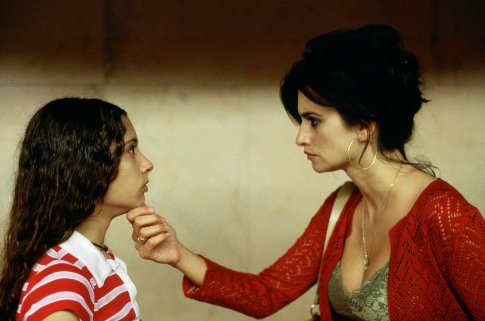
 His last two films, Bad Education and Talk To Her, were impressive, though I never quite felt the unconditional rapture of the true Almodo'var believer. This new film, being more modest in its scope, and somehow less obviously extravagant, achieves more with its rhetorical flourishes and narrative display. There is something so playful and gorgeous about it, and certainly something gorgeous about Pene'lope Cruz: although the film is notable in that romantic love is quite irrelevant. Cruz's beauty appears in an altogether different love-context: that of a mother's passionate love for her daughter.
His last two films, Bad Education and Talk To Her, were impressive, though I never quite felt the unconditional rapture of the true Almodo'var believer. This new film, being more modest in its scope, and somehow less obviously extravagant, achieves more with its rhetorical flourishes and narrative display. There is something so playful and gorgeous about it, and certainly something gorgeous about Pene'lope Cruz: although the film is notable in that romantic love is quite irrelevant. Cruz's beauty appears in an altogether different love-context: that of a mother's passionate love for her daughter.
Volver, (in English, Coming Home or Coming Back), is a gripping melodrama inspired by the trash TV that is a soundtrack to its characters' lives. Pene'lope Cruz is Raimunda, a hard-working woman with a teenage daughter, Paula (Yohana Cobo), and a feckless, layabout husband. With her sister Sole (Lola Duen~as) she tends to the graves of her parents, and visits her ailing Aunt Paula (Chus Lampreave), who is heartrendingly in the final stages of dementia. Raimunda's family life shatters with one terrible act of violence, and there is a secret about her late mother Irene (Carmen Maura) that surfaces when Irene returns from beyond the grave to make contact with her astonished daughters.
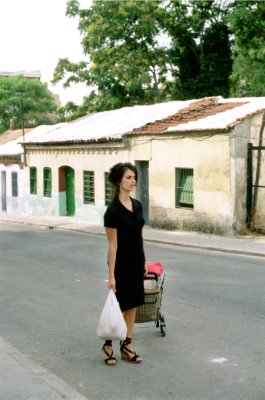 So Volver is a ghost story. Or is it? As the movie drifts along the periphery of the supernatural, I went into a trance, which Almodo'var induces with a master's confidence. All the movie's secrets are rolled out in a narrative design that is exuberant and elegant. Its cinematography and art direction, by Jose' Luis Alcaine and Salvador Parra, give everything an intensity that, like previous Almodo'var films, has the feel of a Douglas Sirk film. Almodo'var has something of Sirk's passionate empathy with women, mixed with a gay sensibility - though the film is unlike Sirk's in that men are entirely marginal. In its vividness and intense, almost neurotic sensitivity to colour, particularly the colour red, it also looks like a Hitchcock thriller.
So Volver is a ghost story. Or is it? As the movie drifts along the periphery of the supernatural, I went into a trance, which Almodo'var induces with a master's confidence. All the movie's secrets are rolled out in a narrative design that is exuberant and elegant. Its cinematography and art direction, by Jose' Luis Alcaine and Salvador Parra, give everything an intensity that, like previous Almodo'var films, has the feel of a Douglas Sirk film. Almodo'var has something of Sirk's passionate empathy with women, mixed with a gay sensibility - though the film is unlike Sirk's in that men are entirely marginal. In its vividness and intense, almost neurotic sensitivity to colour, particularly the colour red, it also looks like a Hitchcock thriller.
There is a wonderful overhead shot of Raimunda washing up a bloodstained knife in the kitchen sink. On the left of the screen, we see the implement of violence in the plastic bowl above the soiled plates, and on the right there is the glistening crown of Raimunda's glorious raven hair and her magnificent cleavage - the size of which her mother is later wonderingly to remark upon, and in which nestles an enamel miniature of the crucified Christ. The image goes beyond camp, and certainly beyond desire, into a feminised world in which work, survival and family love are paramount. A neighbour asks about the bloodstain on her neck, and quick-thinking Raimunda says it is merely "women's trouble": a laugh line that relieves the tension, but is also nothing more nor less than the truth.
When Cruz struts with unselfconscious sexiness through the streets, carrying a rounded, wiggling behind that might almost be prosthetic, she resembles the young Sophia Loren. She moves, however, without the soundtrack of wolf-whistles that earlier ages might have composed for her. There are a couple of men in the picture who are in love with Raimunda, but they are tentative and almost reticent in their adoration.
Her real relationship is with her daughter, her sister, her mother and with her garrulous women-friends and neighbours - all chattering, laughing and, at a funeral, mumbling prayers like a swarm of pious, black-clad bees. But of course, Cruz is intensely engaged with one man: Almodo'var himself, who manages to draw out her presence like a ductile material and spread it all over his movie. Only Cruz could have carried off those hoop earrings, as big as soup-plates, and on anyone else her black top with the flowery design might have looked as if it came from Primark. On her it looks sensational, and its floral motif is carried over into the final credit sequence.
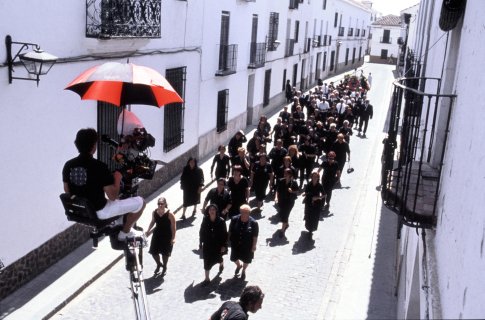 It is this context of beauty, richly sensual without being sexual, that makes the gestures of tragicomedy and passion so affecting. When Raimunda says to her miraculously returned mother: "I don't know how I have lived all these years without you ..." it is absurd, and comic, but also intensely poignant. And as often in the past, Almodo'var makes a song a central moment in the film. Raimunda has abandoned her dreary day jobs to take over an absent friend's restaurant and cater for a visiting movie crew. Here, she impulsively decides to sing to the assembled company a showstopping lament about the return of past lives and loves - an irresistibly generous and emotional event.
It is this context of beauty, richly sensual without being sexual, that makes the gestures of tragicomedy and passion so affecting. When Raimunda says to her miraculously returned mother: "I don't know how I have lived all these years without you ..." it is absurd, and comic, but also intensely poignant. And as often in the past, Almodo'var makes a song a central moment in the film. Raimunda has abandoned her dreary day jobs to take over an absent friend's restaurant and cater for a visiting movie crew. Here, she impulsively decides to sing to the assembled company a showstopping lament about the return of past lives and loves - an irresistibly generous and emotional event.
No other director has as much swoon factor as Pedro Almodo'var: the texture of his movie-making is quite unique. Volver could have gone on for another hour or two: there seemed so much more to say. What a triumph for this great European director who just seems to get better and better.
The Darkest of Troubles in the Brightest of Colors, by A.O. SCOTT NY Times
The action in "Volver" moves back and forth between a workaday neighborhood in Madrid and a windswept village in the Spanish countryside. Really, though, the movie takes place in a familiar, enchanted land . Almodovaria, you might call it, or maybe Pedrostan. where every room and street corner is saturated with bright color and vivid feeling and where discordant notes of violence, jealousy and fear ultimately resolve in the deeper harmonies of art.
Pedro Almodovar, the benevolent deity of this world, has revealed it - or, rather, created it - piece by piece from one film to the next. His two previous movies, "Talk to Her" (2002) and "Bad Education" (2004), explored previously uncharted regions of masculine melodrama, while "Volver," whose title can be translated as "to return," revisits the woman-centered territory of "All About My Mother" (1999) and "Women on the Verge of a Nervous Breakdown" (1988). Drawing on influences ranging from Latin American telenovelas to classic Hollywood weepies and on an iconography of female endurance that includes Anna Magnani and Joan Crawford, Mr. Almodovar has made yet another picture that moves beyond camp into a realm of wise, luxuriant humanism.
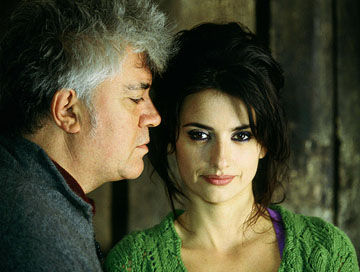 "Volver," full of surprises and reversals, unfolds with breathtaking ease
and self-confidence. It is in some ways a smaller, simpler film than
either "Talk to Her" or "Bad Education," choosing to tell its story
without flashbacks or intricate parallel plots, but it is no less the work of
a master. And it's a testament to the filmmaker's generosity of spirit that
he effectively hands the movie over to its ensemble of lively and
resourceful actresses, and in particular to its star, Penelope Cruz.
Ms. Cruz plays Raimunda, a hard-working woman pulled in every
direction by terrible events and by the needs of the women around her.
At one point in the film she answers a knock on the door from her
neighbor, Emilio (Carlos Blanco), one of the tiny, mostly superfluous
handful of men who appear on screen. Emilio, who clearly has a crush
on Raimunda, notices a streak of blood on her neck and asks if she's all
right. "Women's troubles," she says with a quick smile, which is both a
startlingly risque joke and the literal truth.
"Volver," full of surprises and reversals, unfolds with breathtaking ease
and self-confidence. It is in some ways a smaller, simpler film than
either "Talk to Her" or "Bad Education," choosing to tell its story
without flashbacks or intricate parallel plots, but it is no less the work of
a master. And it's a testament to the filmmaker's generosity of spirit that
he effectively hands the movie over to its ensemble of lively and
resourceful actresses, and in particular to its star, Penelope Cruz.
Ms. Cruz plays Raimunda, a hard-working woman pulled in every
direction by terrible events and by the needs of the women around her.
At one point in the film she answers a knock on the door from her
neighbor, Emilio (Carlos Blanco), one of the tiny, mostly superfluous
handful of men who appear on screen. Emilio, who clearly has a crush
on Raimunda, notices a streak of blood on her neck and asks if she's all
right. "Women's troubles," she says with a quick smile, which is both a
startlingly risque joke and the literal truth.
Such troubles! The blood belongs to her husband, Paco (Antonio de la Torre), who has recently expired in a bright crimson pool on the kitchen floor after taking a carving knife to the belly. His killing is not exactly to be shrugged off - and he does eventually receive a proper burial of sorts - but he is not exactly mourned either. Men, for Raimunda and her circle, tend to be malevolent, irrelevant or simply absent: straying husbands, predators, dead bodies. They cause a fair amount of trouble, but the point of "Volver" is that it's not about them.
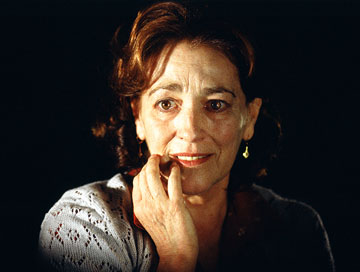 It is about what American feminists of an earlier era called sisterhood,
and also about the complicated bonds of kinship and friendship that Mr.
Almodovar observed as a child growing up among women in traditional,
patriarchal, gender-separated (and fascist) Spain. Raimunda's troubles
may be extreme, but she bustles through them with passionate
determination, making room for every emotion except self-pity. There
are too many other people who need her sympathy, above all her
teenage daughter, Paula (Yohana Cobo), who was subject to Paco's
lecherous, unwelcome attention. Raimunda must also tend to Sole (the
wonderful Lola Duenas), her sister, whose face registers loneliness and
disappointment even as she tries to radiate busyness and good cheer; to
their elderly Aunt Paula (Chus Lampreave); and to Agustina (Blanca
Portillo), a neighbor whose sorrows could easily fill another movie.
There is also a restaurant to run (it's Emilio's, but Raimunda takes over
in his absence) and, on the other side of the screen, an audience to tease,
charm, provoke and wrap around one of her long, expressive fingers.
It is about what American feminists of an earlier era called sisterhood,
and also about the complicated bonds of kinship and friendship that Mr.
Almodovar observed as a child growing up among women in traditional,
patriarchal, gender-separated (and fascist) Spain. Raimunda's troubles
may be extreme, but she bustles through them with passionate
determination, making room for every emotion except self-pity. There
are too many other people who need her sympathy, above all her
teenage daughter, Paula (Yohana Cobo), who was subject to Paco's
lecherous, unwelcome attention. Raimunda must also tend to Sole (the
wonderful Lola Duenas), her sister, whose face registers loneliness and
disappointment even as she tries to radiate busyness and good cheer; to
their elderly Aunt Paula (Chus Lampreave); and to Agustina (Blanca
Portillo), a neighbor whose sorrows could easily fill another movie.
There is also a restaurant to run (it's Emilio's, but Raimunda takes over
in his absence) and, on the other side of the screen, an audience to tease,
charm, provoke and wrap around one of her long, expressive fingers.
With this role Ms. Cruz inscribes her name near the top of any credible list of present-day flesh-and-blood screen goddesses, in no small part because she manages to be earthy, unpretentious and a little vulgar without shedding an ounce of her natural glamour. What's more, Mr. Almodovar has had the sly inspiration to cast Carmen Maura, one of the stars of his early, madcap period, as Raimunda's mother, who seems to have returned from the dead to add a touch of the gothic (and the surreal) to the proceedings. Ms. Maura's warm good humor is a crucial element in the film's emotional design. It is a chronicle, mostly, of tragedy and horror, rendered in bright, happy colors.
To relate the details of the narrative - death, cancer, betrayal, parental abandonment, more death . would create an impression of dreariness and woe. But nothing could be further from the spirit of "Volver," which is buoyant without being flip, and consoling without ever becoming maudlin. Mr. Almodovar acknowledges misfortune - and takes it seriously - from a perspective that is essentially comic. Very few filmmakers have managed to smile so convincingly in the face of misery and fatality: Jean Renoir and Billy Wilder come immediately to mind, and Mr. Almodovar, if he is not yet their equal, surely belongs in their company. "Volver" is often dazzling in its artifice - Jose Luis Alcaine's ripe cinematography, Alberto Iglesias's suave, heart-tugging score - but it is never false. It draws you in, invites you to linger and makes you eager to return. It offers something better than realism. The real world, after all, is where we all have to live; for some of us, though, Mr. Almodovar's world is home.
Almodavar's website - includes shooting journal for Volver.
Cast
 Penelope Cruz ... Raimunda
Penelope Cruz ... Raimunda
Carmen Maura ... Irene
Lola Duen~as ... Sole
Blanca Portillo ... Agustina
Yohana Cobo ... Paula
Chus Lampreave ... Ti'a Paula
Antonio de la Torre ... Paco
Carlos Blanco ... Emilio
Mari'a Isabel Di'az ... Regina (as Isabel Di'az)
Neus Sanz ... Ine's (as Nieves Sanz Escobar)
Leandro Rivera ... Auxiliar Produccio'n
Yolanda Ramos ... Presentadora TV
Carlos Garci'a Cambero ... Carlos
Pepa Aniorte ... Vecina
Elvira Cuadrupani ... Vecina